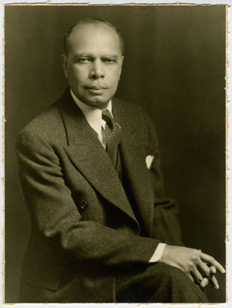Campus News
February 18, 2011
Grant renewal supports Johnson Institute's Visiting Scholars Program

James Weldon Johnson
The James Weldon Johnson Institute's one-of-kind residency program for civil rights scholars recently received a boost of confidence from the Andrew W. Mellon Foundation, which has renewed funding until 2014.
The Mellon Foundation has pledged $533,000 to the Visiting Scholars Program, a central component of the Johnson Institute's mission. Since 2007, the program has hosted junior and senior scholars in the humanities, humanistic social sciences and law. Scholars are assigned to a faculty host in one of the following departments or schools: music, history, african american studies, english, law and the Graduate Institute of the Liberal Arts.
The five scholars on campus this academic year — constituting the largest cohort in the program's history — each teach one undergraduate or graduate-level course and present their research in a symposium co-sponsored by the Bill and Carol Fox Center for Humanistic Inquiry. Scholars are also given the breathing room to explore new models of interdisciplinary scholarship, with access to resources on campus and beyond, including Emory's Manuscript, Archives, and Rare Book Library and the city of Atlanta as the spiritual home of the modern civil rights movement.
"Before this program was created, these scholars worked in a fragmentary way and were not part of a community," says Rudolph P. Byrd, founding director of the James Weldon Johnson Institute for Advanced Interdisciplinary Studies. "Here, they receive a network of support beyond the institute itself."
Bringing in outside scholars accomplishes two main goals, says Earl Lewis, provost and executive vice president for academic affairs: "Emory scholars help share intellectual debates more broadly and we become known as a place for serious discussions on race and civil rights."
Visiting Scholar Richard Steven Street, an award-winning historian, photographer and journalist, is spending his time at the Johnson Institute working on two books chronicling the struggle for human rights among California farm workers. He is also teaching an undergraduate course in "Liberation Photography," focused on wartime and civil rights photography.
"I specifically wanted to come to the Johnson Institute because what I'm doing is centered on civil rights, but it's another dimension of the civil rights story that hasn't gotten the same play," he says. "It's the perfect experience."
The other 2010-2011 Visiting Scholars are:
• Devin Fergus, assistant history professor at Hunter College at the City University of New York. Fergus is finishing research on his book, "Land of the Fee," which examines the historical reasons for the rapid increase in economic inequality beginning in the 1970s, how policymakers have addressed this disparity and its overall significance to U.S. and global politics.
• Kai Jackson Issa, managing editor of the Howard Thurman Papers Project at Morehouse College. Issa is completing a critical anthology of the letters and writings of Sue Bailey Thurman, an important figure in the 20th century movement for social justice and civil rights and wife of noted theologian Howard Thurman.
• Vincent Lloyd, assistant professor of religious studies at Georgia State University. Lloyd studies the role of natural law language, including "higher law" and "God's law," in African American political thought and rhetoric from Frederick Douglass to Martin Luther King Jr.
• Shana Redmond, assistant professor of American studies and ethnicity at the University of Southern California. Redmond is finishing her manuscript, "Anthem: Movement Cultures and the Sound of Solidarity in the African Diaspora," which links the development and performance of anthems in Afro-diasporic populations to the cultural, social and political fabric of the African diaspora in the 20th century.
